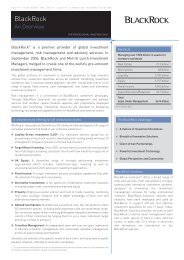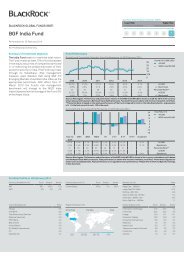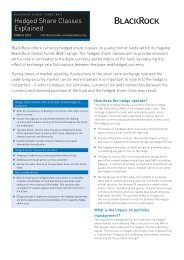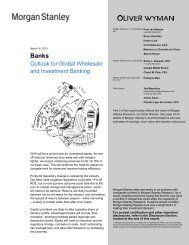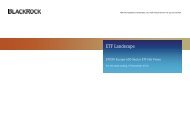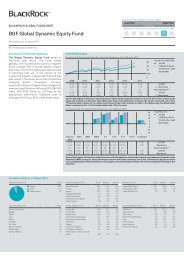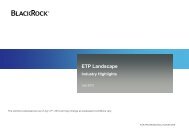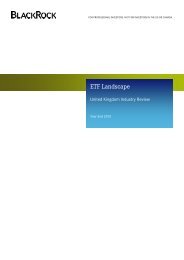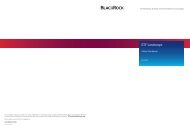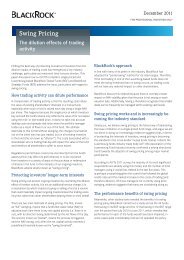Prospectus (4.96 Mb) - BlackRock International
Prospectus (4.96 Mb) - BlackRock International
Prospectus (4.96 Mb) - BlackRock International
You also want an ePaper? Increase the reach of your titles
YUMPU automatically turns print PDFs into web optimized ePapers that Google loves.
proxy contests, public filings, litigation expenses and indemnification payments to the investment manager or persons<br />
serving at the investment manager’s request on the boards of directors of companies in which such Fund Investment has<br />
an interest. It should also be noted that any such board representatives have a fiduciary duty to act in the best interests of<br />
all shareholders, and not simply the Fund Investment, and thus may be obligated at times to act in a manner that is<br />
adverse to the Fund Investment’s interests. The occurrence of any of the above events may have a material adverse effect<br />
on the performance of the Fund Investments and consequently on the performance of the Company.<br />
ILLIQUID INVESTMENTS AND MARKET CHARACTERISTICS<br />
Investments held by Fund Investments may be or become illiquid which may affect the ability of the Fund Investments to<br />
exit such investments, the returns made by those Fund Investments and in turn the Company. Such illiquidity may result<br />
from various factors, such as the nature of the instrument being traded, or the nature and/or maturity of the market in<br />
which it is being traded, the size of the position being traded, or because there is no established market for the relevant<br />
securities. Even where there is an established market, the price and/or liquidity of instruments in that market may be<br />
materially affected by certain factors. Securities and commodity exchanges typically have the right to suspend or limit<br />
trading in any instrument traded on that exchange. It is also possible that a governmental authority may suspend or<br />
restrict trading on an exchange or in particular securities or other instruments traded. A suspension could render it<br />
difficult for the Fund Investments to liquidate positions and thereby might expose the Company to losses.<br />
The market prices, if any, for such illiquid investments tend to be volatile and may not be readily ascertainable and the<br />
relevant Fund Investments may not be able to sell them when it desires to do so or to realise what it perceives to be their<br />
fair value in the event of a sale. Because of valuation uncertainty, the fair values of such illiquid investments reflected in<br />
the net asset value of a Fund Investment (and thereby in the Net Asset Value of the Company) attributable to such<br />
investment may not necessarily reflect the prices that would actually be obtained by the Fund Investment when such<br />
investments are realised. If the realisation occurs at a price that is significantly lower than the Net Asset Value<br />
attributable to such investment, the Company will suffer a loss. Moreover, securities in which the Fund Investments may<br />
invest include those that are not listed on a stock exchange or traded in an over-the-counter market. As a result of the<br />
absence of a public trading market for these securities, they may be less liquid than publicly traded securities. The size of<br />
the Fund Investments’ positions may magnify the effect of a decrease in market liquidity for such instruments. Changes in<br />
overall market leverage, deleveraging as a consequence of a decision by the counterparties with which the Fund<br />
Investments enter into repurchase/reverse repurchase agreements or derivative transactions to reduce the level of<br />
leverage available, or the liquidation by other market participants of the same or similar positions, may also adversely<br />
affect the Fund Investments’ portfolios.<br />
The sale of restricted and illiquid securities often requires more time and results in higher brokerage charges or dealer<br />
discounts and other selling expenses than does the sale of securities eligible for trading on national securities exchanges<br />
or in the over-the-counter markets. Fund Investments may encounter substantial delays in attempting to sell non-publicly<br />
traded securities. Although these securities may be resold in privately negotiated transactions, the prices realised from<br />
these sales could be less than those originally paid by the Fund Investments. In some cases, Fund Investments may be<br />
contractually prohibited from disposing of investments for a specified period of time. Restricted securities may sell at a<br />
price lower than similar securities that are not subject to restrictions on resale. Further, companies whose securities are<br />
not publicly traded are not subject to the disclosure and other investor protection requirements which would be applicable<br />
if their securities were publicly traded.<br />
In addition, Fund Investments themselves may be or become illiquid, their marketability may be restricted and the<br />
realisation of investments from them may take a considerable time and/or be costly, in particular because Fund<br />
Investments may have restrictions that allow redemptions only at specific infrequent dates with considerable notice<br />
periods, and apply lock-ups and/or redemption fees. The Company’s ability to withdraw monies from or invest monies in<br />
Fund Investments with such restrictions will be limited and such restrictions will limit the Company’s flexibility to<br />
reallocate such assets among Fund Investments. In addition, Fund Investments may have the ability to temporarily<br />
suspend the right of their investors to redeem their investment during periods of exceptional market conditions. It may<br />
therefore be difficult for the Company to sell or realise its investments in the Fund Investments in whole or in part. In<br />
addition, liquidity may be subject to commitments made by the Investment Manager or the External Investment Advisors<br />
as to the frequency of redemptions and/or length of lock-up periods to secure capacity with such Fund Investments.<br />
In addition, the use of leverage by the Company may compound the risks associated with liquidity of investment assets, as<br />
the Company must maintain a certain degree of liquidity, based on its leveraged position, in order to service its debt.<br />
Failure to maintain such necessary liquidity may materially adversely affect the Company.<br />
NON-US EXCHANGE RISK EXPOSURE<br />
Although Fund Investments are typically denominated in US Dollars, certain Fund Investments may invest in securities<br />
denominated, and may receive a portion of their income and gains, in currencies other than the US Dollar. A reduction in<br />
the value of such other currencies relative to the US Dollar prior to conversion into US Dollars, as applicable, would<br />
adversely affect the net asset value of the Fund Investment and correspondingly, the Net Asset Value of the Company. The<br />
Company does not expect to hedge the exchange exposure related to any Fund Investments. To the extent that the<br />
External Investment Advisers themselves seek to hedge non-US exchange risk exposure, they may not be able to do so.<br />
See “Risks relating to the Investment Strategy — Currency hedging”. Also see “Risks relating to an investment in the<br />
18



